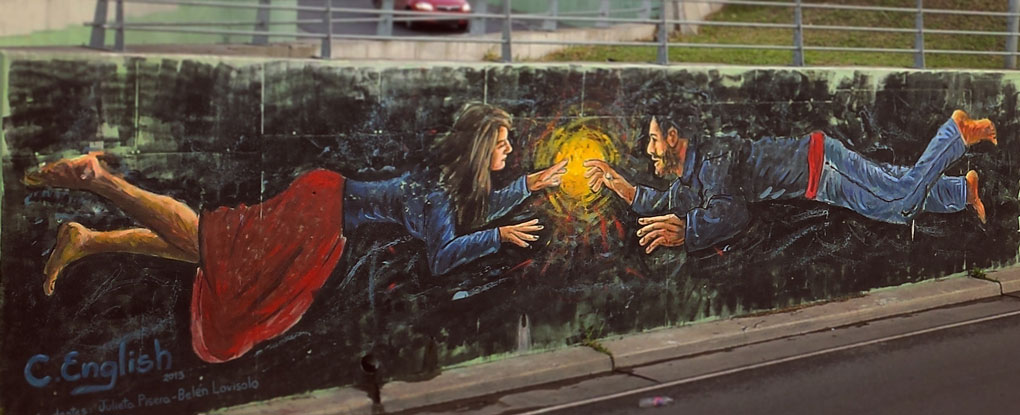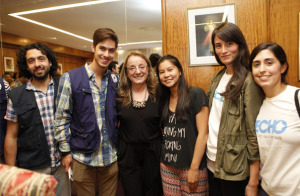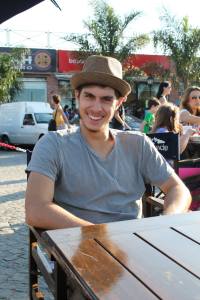Read about Austin Wong's experience in Argentina during his time as an intern in the CFHI: Primary Care and Social Medicine program.

Six weeks ago, I took my first step off the airport bus into the streets of Buenos Aires. Instantly, a rush of new sights and sounds jumped out at me. Apartments and offices of varying styles towered over me from all sides. Graffiti lined the buildings. A steady stream of buses and taxis could be heard a block away. Piles of garbage circled the tree nearby the overflowing dumpster. Unfamiliar words and faces strolled by me. And the odor of dog poop marked its presence in the air. The quiet, peaceful, open feeling of the Cascades and its fresh, crisp air were nowhere to be found. I had arrived in a completely different environment. And I was well aware of it.
 Let’s fast forward to week five. I’ve adjusted to living in the city. I have a flow to my schedule, bouncing around from my internship to meeting up with friends to exploring the neighborhoods to finding more spots to call my own – those places where I can just go to recharge my batteries and feel at ease. The sounds that I exchange with other friends, coworkers, and strangers don’t seem quite as foreign anymore. I’m sitting in Raúl’s office, my supervisor and the General Projects Coordinator of Médicos del Mundo, discussing a paper about children’s rights. The first couple of weeks at the internship I had read some other papers that covered topics of general planning and philosophy too. I wondered, “Why am I reading these papers if I signed up for a public health internship?”
Let’s fast forward to week five. I’ve adjusted to living in the city. I have a flow to my schedule, bouncing around from my internship to meeting up with friends to exploring the neighborhoods to finding more spots to call my own – those places where I can just go to recharge my batteries and feel at ease. The sounds that I exchange with other friends, coworkers, and strangers don’t seem quite as foreign anymore. I’m sitting in Raúl’s office, my supervisor and the General Projects Coordinator of Médicos del Mundo, discussing a paper about children’s rights. The first couple of weeks at the internship I had read some other papers that covered topics of general planning and philosophy too. I wondered, “Why am I reading these papers if I signed up for a public health internship?”
Then we came across a point in the paper that stressed the importance of including the child’s or adolescent’s perspective and opinion in the discussions of policies about childhood health and human rights. Raúl made an analogy to an anthropologist viewing another culture from inside that culture rather than from the point of view of his/her own upbringing. At that moment, I had an epiphany. I had been viewing everything from a pair of contact lenses preset to view health practices, Argentine culture and customs, and life in general in terms of how it would fit into my life and my way of doing things. Like my first step off the bus, I had compared everything to my upbringing, making note of all the differences. I regarded my idea of health as the definition of health when all along it had only been another man-made idea just like any other idea of what health or childhood should be.
 With a slight adjustment to my thinking, I began contextualizing everything from then on. I asked myself why childhood rights (in regard to medical work) would be important to someone growing up in Buenos Aires instead of why they would be important to someone growing up in Salem, Oregon. Now, I try my best to remind myself to view things from a local perspective. A lot of us know this can be good to practice, but it can be quite easy to automatically fall back into our natural ways of thinking, especially over time. With enough repetition though, I believe we can re-wire our brains to open up our minds to new possibilities, making any experience abroad that much more powerful and meaningful.
With a slight adjustment to my thinking, I began contextualizing everything from then on. I asked myself why childhood rights (in regard to medical work) would be important to someone growing up in Buenos Aires instead of why they would be important to someone growing up in Salem, Oregon. Now, I try my best to remind myself to view things from a local perspective. A lot of us know this can be good to practice, but it can be quite easy to automatically fall back into our natural ways of thinking, especially over time. With enough repetition though, I believe we can re-wire our brains to open up our minds to new possibilities, making any experience abroad that much more powerful and meaningful.